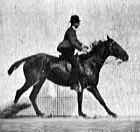Wikipedia:Don't jump the gun
This is an essay. It contains the advice or opinions of one or more Wikipedia contributors. This page is not an encyclopedia article, nor is it one of Wikipedia's policies or guidelines, as it has not been thoroughly vetted by the community. Some essays represent widespread norms; others only represent minority viewpoints. |

Avoid jumping the gun when adding events to various lists and articles on Wikipedia. Often, the inclusion of events in lists and articles is premature given the information available from reliable sources. In such cases, it is best to wait for sources to explicitly proclaim an event as meeting the criteria for inclusion in the list or to be sufficiently related to a particular article. Even if it seems "obvious" that the event belongs somewhere, it constitutes original research to make any connections without support from reliable sources to verify the claim.
Be cautious of initial event narratives. Even the most reliable sources have track records of errors when it comes to breaking news (see WP:RSBREAKING). Within the initial hours of a major event, information changes rapidly and should not always be trusted. The details of any event will eventually become clear and there is no need to report breaking news as it happens. It is better to wait for details to be confirmed than to repeat speculation, unconfirmed reports, and rumors. It may look like a duck and sound like a duck, but let sources call it a duck before adding content about it to the mainspace.
Wikipedia, as a tertiary source, is always "behind the times". There is no deadline to complete an article. As an encyclopedia, we do not worry about up-to-the-minute late-breaking news (that is for WikiNews). Rather, we detail past events with the clarity of time based on reliable sources.
Common cases
Shootings and terrorism
Mass casualty events are often presented as breaking news, but details will inevitably change. News outlets often report events according to witnesses' initial impressions or anonymous sources. These reports are dubious and should be triangulated with multiple reliable sources. Report qualified statements as qualified; do not state rumors or hearsay as fact.[clarification needed]
Avoid proclaiming an event terrorism (or e.g. Islamist terrorism) unless multiple reliable sources support such a claim. The modus operandi may appear the same or bystanders may report telltale indicators (e.g. Nazi symbols, Allahu ackbar shouted, ethnicity of perpetrators), but we cannot conduct our own synthesis and we must rely upon statements by officials in reliable sources.
Another area where we need to be cautious is claims of responsibility for attacks. Certain organisations are notorious for claiming an attacker as "a soldier of theirs", or of perpetrating the attack on their behalf, even though investigators subsequently find no tangible link to the organisation. If it is reliably reported that the organisation claimed responsibility, we can report that as their claim, but should not confuse a claim with a fact, or enter the claim in infoboxes, lists, or elsewhere as though it is clearly established.
Deaths
Celebrity deaths are common, but subject to fake news and hoaxes. Wait for reliable sources to report a death as verified. Also, don't state the cause of death until it is clearly established.
Politics
During political campaigns, news about announcements and endorsements are abundant. However, they are often leaked by anonymous sources and not always verifiable. There is no harm in waiting for a politician to make an official announcement or press release.
Examples
The following are examples of breaking news and media reports that eventually changed or were shown to be incorrect or cases when reliable sources had not caught up to social media reports.
- Dewey Defeats Truman
- 2011 Norway attacks, initially widely speculated as being perpetrated by "Islamist fanatics",[1] in fact done by a right-wing extremist.
- 2016 Munich shooting, a 'Muslim' witness claimed that she had heard the gunman shout "Allahu Akbar",[2]. Also Boris Johnson 'jumped the gun' to blame Islamist terrorists.[3] The killer turned out to be obsessed by mass shootings and, according to his parents, was a convert to Christianity.
- Many editors changed Prince's article to reflect his death before reliable sources were available.[4]
- News reported police announcements of two snipers during the 2016 shooting of Dallas police officers and circulated an image of a man thought to be a shooter who later was found to be innocent.[5]
- The 2016 Ohio State University attack was originally reported as a shooting with possibly two shooters.[6]
- The 2017 Resorts World Manila attack was originally reported as terrorism by multiple gunmen by the media and Donald Trump, but was later said to be a robbery by a single gunman.[7][8]
See also
- meta:Eventualism
- Wikipedia:Identifying reliable sources#Breaking news
- Wikipedia:No angry mastodons
- Wikipedia:Notability (events)#Breaking_news
- Wikipedia:The world will not end tomorrow
- Wikipedia:There is no deadline
- Wikipedia:Wikipedia can wait
References
- ^ Macdonald, Alastair (25 July 2011). "Instant media wounded by rush to judgment on Oslo". Reuters. Retrieved 11 July 2017.
- ^ Shoichet, Catherine E. (23 July 2016). "Munich shooting: 9 victims, gunman dead, police say". CNN. Retrieved 11 July 2017.
Lauretta said she heard the gunman say, "Allahu Akbar," or God is great. "I know this because I'm Muslim
- ^ Wintour, Patrick (24 July 2016). "Boris Johnson rebuked for blaming Munich shooting on terrorists". The Guardian. Retrieved 11 July 2017.
- ^ https://en.wikipedia.org/w/index.php?title=Prince_(musician)&offset=20160421202903&limit=500&action=history
- ^ https://web.archive.org/web/20160708081203/http://www.cnn.com/2016/07/07/us/philando-castile-alton-sterling-reaction/index.html
- ^ https://web.archive.org/web/20161128162108/http://www.cbsnews.com/news/ohio-state-university-active-shooter-on-campus/
- ^ http://www.bbc.com/news/world-asia-40123389
- ^ http://news.abs-cbn.com/news/06/01/17/gunman-in-resorts-world-attack-kills-self-police